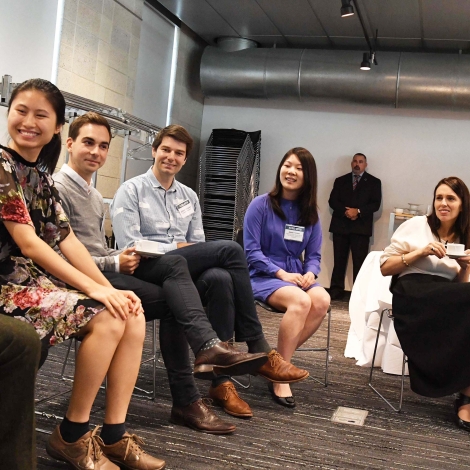Sustainable development needs to transcend traditional boundaries to improve its efficacy. Experts working at the intersection of technology and sustainable development espoused this value—transcending boundaries and collaborating across disciplines—with great virtue during the sixth annual International Conference on Sustainable Development at Columbia University in New York City, New York. A movement in technology development exemplifies the concept: open source.
Wakabi: Uber for rural Uganda
Silvia Figueira, director of their Frugal Innovation Hub at Santa Clara University in Santa Clara, California, provided a prominent example of the power of better collaboration and open source technology during breakout session called Technology and Innovation for the Sustainable Development Goals. Dr. Figueira discussed her students’ work on Wakabi, the product of an interdisciplinary team that created an SMS-based transport service for rural Ugandans styled after Uber. Students studying economics partnered with students in the engineering department to develop the idea and the app. The team didn’t simply create the technology at Santa Clara and hope that it would work as expected when deployed in Uganda. Instead, they donated the code to local developers in Uganda, who were then able to further modify it to be more locally applicable. The result is the Wakabi social enterprise, operating since 2015.
U-Report: communication technology for crises
In another example of the value of transcending boundaries, UNICEF maintains U-Report, a free social messaging tool that allows anyone anywhere in the world to report on development issues and children’s rights. The service has nearly 6 million registered members at the time of publication. The platform has played a role in breaking down communication barriers during crisis situations, Mr. Fabian says. He also spoke extensively of algorithmic equity—ensuring all populations are served by the technology being deployed—and information poverty—ensuring all populations have access to information. In a similar vein, UNICEF is moving towards an increasingly open-source approach to innovation, as evidenced by their open-source RapidPro platform, as well.
Open source / cross disciplinary collaboration
Echoes of the values of open-source technology in sustainable development rang throughout the conference. During poster sessions, novel solutions for everything from smart farming incorporating big data and a networked sensor hub to using a blockchain platform to increase CO2 mitigation activities with cryptocurrencies were presented. Jeffrey Sachs, a university professor at Columbia and one of the architects of the Sustainable Development Goals, further championed the importance of technology asking engineers and students to apply their skills to the pressing issues facing sustainable development today.
The Technology and Innovation for the SDGs session leaders also called for more cross-disciplinary collaboration in sustainable development. Paul Cunningham, Director of the IST-Africa Institute and Chair of the IEEE Humanitarian Activities Committee, made the astute observation that “engineers don’t realize how much they can contribute to a society at large.” Dr. Cunningham further warned of the tendency many of us have to be firmly rooted in our disciplines without an understanding of the potential for contribution from other fields. If there is one action item to be suggested as a summation of all the discussions at IC-SD 2018, it would be working in true partnership across disciplines with openness and transparency. Essentially, that is, practitioners should apply the concepts of open-source technology to any work we do.
For more the conference, please see the video below.
About the Author
Sanjana is an undergraduate of electrical engineering at Virginia Commonwealth University in Richmond, Virginia.

